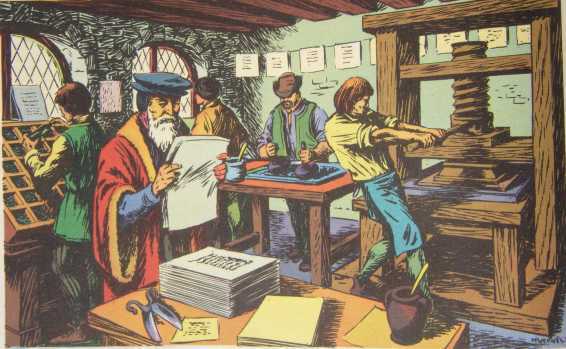Lecture Summary: Block Books and Baroque (1450-1750)
Today’s lecture featured the introduction to different typesets as well as the development of books and media during the Renaissance and Baroque periods. The first printing system was developed by Johannes Gutenburg and Johann Fust, but shortly before finishing the printing of the first bible of 1,282 pages, Gutenberg was sued and became bankrupt by his partner Johann Fust.
I found this fact quite saddening but funny at the same time. Modern media frequently pulls this scenario in their movies however seeing it done in history was quite a small shock.
The lecture also contained notes on different fonts as well as the history behind it. The arduous process of making metal templates was intriguing, and I would like to see a live demonstration of this process someday. Going back to last weeks lecture, I would also like to see how Chinese chop-seals were made too.
I think the most interesting concept and fact that I will take away from today’s class is the market for different type-faces and invention and origin of the different fonts. Adding on to that, the discussion of different type personalities and how the use of different fonts have a impact on a specific product was great insight from a designers and illustrators perspective.
Research
For today’s research I will be covering the aspects, influence, and importance of Religion during the Renaissance, some ideologies that clashed with Humanism beliefs, and the reformation of the Church.
Influence of the Church before Humanism
Before delving into the time of Humanism and the Religious influence, how much did the church influence it’s people? With the invention of the printing press, procuring a book became less laborious and more accessible to the general public. With the prices of books going down, the access to literature was opened up to the general public compared to the limited handful of wealthy or religious peoples at the time. Bibles were being printed the most, as artistic speech and individualism was not as strong of a concept yet.
The church began to gain power and money through donations and their religious influence; being the only place for spiritual influence during a time of ungrounded scientific research, the people would come to the church seeking repentance and answers. All was not well however, as the church was frequently accused of corruption. This problem was dealt with during the Protestant Reformation.
Humanism

A study of the human body by Leonardo Da Vinci. Leonardo’s would study cadavers to gain a better understanding of the human body, something thought to be forbidden at the time.
The study of Humanism aroused when people started to question how the world worked. Questions like “What is it to be human?”, the importance of rational thought and science, and the passion for the unspoken truth all fuelled the Humanism movement. The church however often excommunicated these scholars and philosophers as heretics in an attempt to uphold their power and belief that god has the answer to everything. The church did not want to promote the idea and questioning of mans relationship with god, and by excommunicating the “heretics” the church would attempt to discourage further discoveries.
Reformation

A page of the Ninety-Five Theses by Martin Luther https://www.thegospelcoalition.org/blogs/evangelical-history/why-did-luther-nail-95-theses-on-the-wittenberg-door/
During the time before the reformation, the church had become greatly involved in politics in western Europe. Due to the corruption, power, and money attained by the church John Calvin and Martin Luther decided that the church needed to be reformed.
Many attempts have been made at reformation, however all attempts ended in failure. The problem of corruption was addressed, however the root of the corruption was not touched.
It was only until Martin Luther posted his Ninety-Five Theses on the door of the Castle church in Wittenberg, Germany that change had truly begun. Martin Luther claimed that the pope had no authority over purgatory and that the doctrine of merits had no foundation in the gospel. Luther claims that “Scripture alone is authoritative and justification is by faith, not by works.”.
Luther’s reformation would result in the eruption of other reformations as well as the separation of Christianity into different groups.
Citation:
https://classroom.synonym.com/humanism-the-roman-catholic-church-12085787.html
https://dailyhistory.org/How_did_the_Renaissance_influence_the_Reformation%3F
https://en.wikipedia.org/wiki/Reformation
https://study.com/academy/lesson/christian-humanism-definition-role-in-the-renaissance.html
https://www.britannica.com/event/Reformation
https://en.wikipedia.org/wiki/Renaissance#Religion
https://rsc.byu.edu/archived/window-faith-latter-day-saint-perspectives-world-history/renaissance-beginning-religious
http://historyhaven.com/worldhistory/Renaissance_Reformation.htm

Leave a Reply